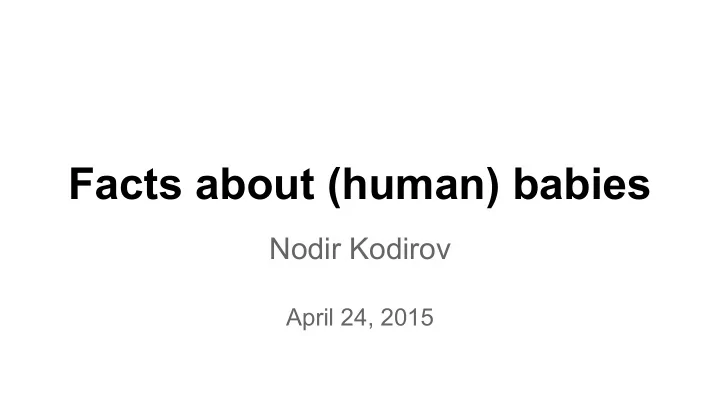

Facts about (human) babies Nodir Kodirov April 24, 2015
Only one UDLS talk about the babies Patrick Colp on May 23, 2008: Baby seals
Daytime or nighttime? ● Night: 11pm-11am ● Day: 11am-11pm ● Night: 6pm - 6am ● Day: 6am-6pm
Daytime or nighttime? ● Night: 11pm-11am -- 55.5% ● Day: 11am-11pm -- 45.5% Consistent with above ● Night: 6pm - 6am ● Day: 6am-6pm Research from Oct. 1952 Source: http://www.ncbi.nlm.nih.gov/pmc/articles/PMC2021502/pdf/brmedj03463-0057a.pdf
Myth: more birth at full moon? Pro facts ● 1959 study broke the month into consecutive three-day periods: full moon window - the day before, day of and day after a full moon ○ full moon window had higher births than any other single three- day period ● Another study in 1966, studied birth rates by moon phase -- full, half, one-quarter and three-quarter. ○ more births centered around the full-moon phase than any other
Myth: more birth at full moon? Againsts facts 1957: Looked at a series of days with abnormally high numbers of births and tried to correlate them with full moons. No correlation was found 1987: Looked at U.S. birth rates by decade and found no correlation between full moons, birth rates or conception rates 1996: Looked at 100 previous studies on lunar effects and found no statistically significant proof of the moon's effect on birth, violence, suicides, major disasters or a dozen other supposedly lunar- connected phenomena 1998: Looked at 3,706 births and found that "scientific analysis of data does not support the belief that the number of births increases as the full moon approaches, therefore it is a myth not reality" 2005: Looked at 564,039 births in North Carolina between 1997 and 2001 and found "no predictable influence of the lunar cycle on deliveries or complications" 2006: Looked at births over a 28-year period in Australia and found that "full moons are not associated with any significant change in the number of conceptions, births, or deaths" Source: http://health.howstuffworks.com/pregnancy-and-parenting/pregnancy/labor-delivery/births-full-moon2.htm
Myth: more birth at full moon? Conclusion: We don’t know ● Howstuffworks concludes by saying: But hey, all is not lost. We can still hang on to one of the best lunar-effect beliefs: There's no hard evidence that the moon doesn't affect werewolves. ● My culture (Uzbekistan) says opposite: new moon brings more babies ● Full moon really only lasts an instant ○ full moon window" of three days, or even one day, is an artificial construct
Birth month: which one is the winner?
Birth month
Peak birth month VS latitude ● Is there a relationship?
Peak birth month VS latitude ● Micaela Martinez-Bakker and Kevin Bakker, both of the University of Michigan, observed a previously unnoticed phenomenon: Peak months for births change with latitude. The most popular month for birthdays occurs earlier and earlier in the year the farther north you travel from the equator. ● Data encompassing 78 years of monthly natality in the USA. Northern states exhibiting spring/summer peaks and southern states exhibiting autumn peaks, a pattern we also observed throughout the Northern Hemisphere. ● Published by the Royal Society on March of 2014. Source: http://rspb.royalsocietypublishing.org/content/281/1783/20132438.abstract
First breath ● Baby lives inside a fluid-filled bag (amniotic sac) in womb ● Amniotic fluid ○ Protects if you have a blow to your tummy ○ Develops baby's lungs and digestive system ○ Protects baby against infection ● What simulates the breath
First breath ● Baby lives inside a fluid-filled bag (amniotic sac) in womb ● Amniotic fluid ○ Protects if you have a blow to your tummy ○ Develops baby's lungs and digestive system ○ Protects baby against infection ● What simulates the breath ○ hormonal and other changes during labour slow down or stop the production of fluid in the lungs ○ this does not happen if labour did not happen (C-section) ○ physical activity still simulates, but other probably factors are not known, yet Source: http://www.aboutkidshealth.ca/en/resourcecentres/pregnancybabies/newbornbabies/yournewbornbabysbody/pages/babys-first-breath.aspx
Name forms http://www.behindthename.com/
Name forms http://www.behindthename.com/
Thank you!
Recommend
More recommend